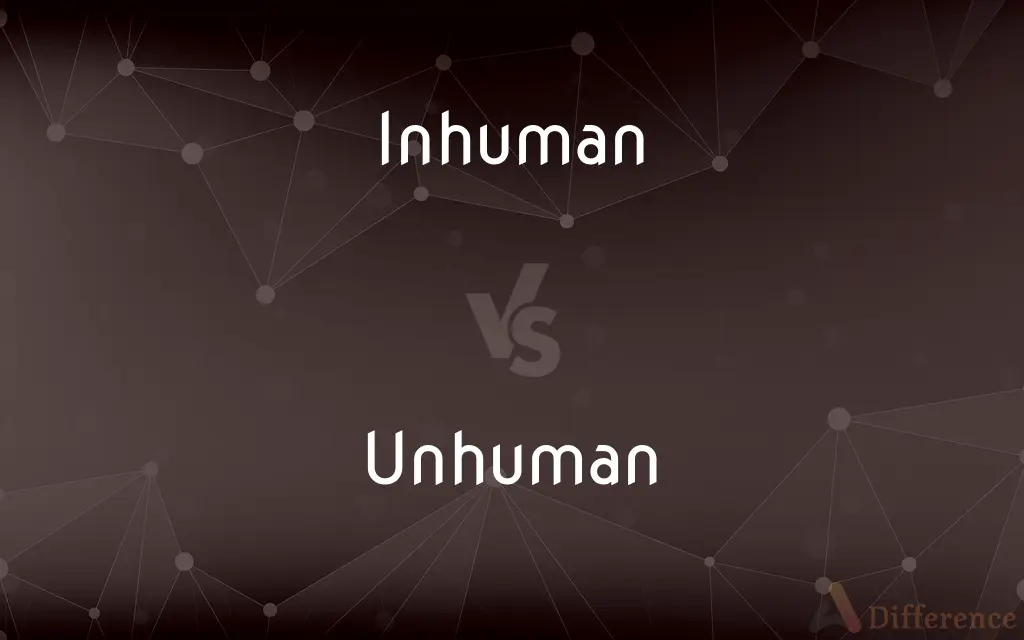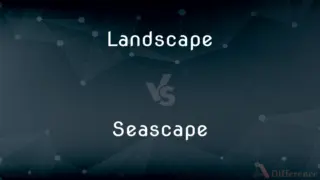Inhuman vs. Unhuman — What's the Difference?
Edited by Tayyaba Rehman — By Fiza Rafique — Updated on March 12, 2024
Inhuman refers to a lack of human warmth or compassion, while unhuman suggests something not human in nature or form.

Difference Between Inhuman and Unhuman
Table of Contents
ADVERTISEMENT
Key Differences
Inhuman often describes acts or behavior that lack compassion, kindness, or decency, reflecting a departure from what is considered morally acceptable for humans. On the other hand, unhuman is used to describe entities or characteristics that are not human in nature or origin. This term doesn't necessarily carry a moral judgment.
Inhuman term typically carries a negative connotation, implying cruelty or brutality. For example, acts of violence or neglect may be described as inhuman, as they starkly contrast with values of empathy and care expected among people. Unhuman can be used to describe things ranging from supernatural beings to artificial intelligence, emphasizing their distinction from human beings in terms of essence, capabilities, or identity.
While inhuman focuses on qualities or actions that betray human decency, unhuman points to the essence or identity of something as fundamentally not human. This distinction highlights the former's association with moral judgment and the latter's with categorization or identity.
The use of inhuman often invokes an emotional response, aiming to highlight actions or behaviors that are deemed unacceptable or reprehensible from a humanistic perspective. It underlines the expectation of a common standard of decency that humans are believed to share. Conversely, unhuman can foster discussions on the nature of humanity and the boundaries that separate humans from other entities or beings. It can evoke curiosity or fascination, as it opens up considerations of what lies beyond the human experience, whether in fiction, philosophy, or technology.
Comparison Chart
Definition
Lacking human warmth, compassion, or decency
Not belonging to or characteristic of humans
ADVERTISEMENT
Connotation
Negative, implying cruelty or moral failure
Neutral, descriptive of origin or essence
Common Usage
Describes acts or behaviors
Describes entities, characteristics, or origins
Emotional Response
Evokes dismay or condemnation
Evokes curiosity or speculative interest
Relation to Humanity
Deviation from expected human morality
Distinction from human identity or nature
Compare with Definitions
Inhuman
Not suitable for human beings.
The prisoners were kept in inhuman conditions.
Unhuman
Alien or otherworldly.
The artifact was of unhuman design.
Inhuman
Lacking the qualities considered typically human.
His inhuman disregard for life was shocking.
Unhuman
Not human in origin or nature.
The forest seemed filled with unhuman sounds at night.
Inhuman
Extremely cruel or barbaric.
The dictator's inhuman policies led to widespread suffering.
Unhuman
Pertaining to beings not classified as human.
Tales of unhuman creatures have always fascinated people.
Inhuman
Beyond the norm of humanity.
She showed an inhuman level of endurance in the face of adversity.
Unhuman
Beyond human understanding or capability.
The scientist pursued knowledge that seemed unhuman.
Inhuman
Lacking compassion or mercy.
The inhuman treatment of prisoners was widely condemned.
Unhuman
Artificial, not natural or human-made.
The AI exhibited unhuman intelligence.
Inhuman
Lacking kindness, pity, or compassion; cruel or indifferent
Inhuman treatment of the prisoners.
Unhuman
Not resembling or having the qualities of a human being.
Inhuman
Not suited for human needs
"The monks sat ... in inhuman quiet" (Maura O'Halloran).
Unhuman
Not human; inhuman.
Inhuman
Not of ordinary human nature, form, or character
"The woman ... lets out a squeal, a strange pig-squeal, completely inhuman" (Ashley Warlick).
Unhuman
Divested of human qualities or attributes
Inhuman
Of or pertaining to inhumanity and the indifferently cruel, sadistic or barbaric behavior it brings.
Inhuman
Transcending or different than what is human.
Inhuman
Destitute of the kindness and tenderness that belong to a human being; cruel; barbarous; savage; unfeeling; as, an inhuman person or people.
Inhuman
Characterized by, or attended with, cruelty; as, an inhuman act or punishment.
Inhuman
Belonging to or resembling something nonhuman;
Something dark and inhuman in form
A babel of inhuman noises
Common Curiosities
What does inhuman mean?
Inhuman refers to a lack of human warmth, compassion, or decency, often implying cruelty or brutality.
Is inhuman always negative?
Yes, inhuman carries a negative connotation, as it implies a significant departure from behaviors considered morally acceptable for humans.
How is unhuman used in literature?
In literature, unhuman might describe supernatural beings, futuristic entities, or concepts that challenge our understanding of humanity.
Are inhuman and inhumane interchangeable?
Inhuman and inhumane are similar but not always interchangeable. Inhumane strictly refers to cruelty or lack of compassion, while inhuman can have broader meanings.
What is the opposite of inhuman?
The opposite of inhuman is humane, which implies kindness, compassion, and decency.
What is the opposite of unhuman?
The opposite of unhuman is human, indicating something characteristic of or belonging to humans.
What does unhuman mean?
Unhuman describes something not human in nature or origin, without necessarily implying a moral judgment.
Can a person be described as unhuman?
Typically, unhuman is used to describe entities or characteristics, not people. Describing a person as unhuman would imply they are not human in nature, which is uncommon.
Can actions be described as unhuman?
Actions are more commonly described as inhuman when they lack compassion or decency. Unhuman doesn't typically apply to actions.
Is it offensive to call someone inhuman?
Yes, calling someone inhuman is offensive as it accuses them of acting without basic human decency or compassion.
Why are unhuman elements popular in fiction?
Unhuman elements are popular in fiction because they expand the imagination, allowing exploration of concepts beyond the human experience.
Can technology be described as unhuman?
Yes, technology, especially advanced AI, might be described as unhuman to emphasize its non-human origin and capabilities.
Can inhuman conditions lead to unhuman characteristics?
In theory, inhuman conditions might lead to behaviors or adaptations that seem unhuman, emphasizing the impact of environment on human traits.
How does society view inhuman behavior?
Society generally condemns inhuman behavior as it goes against widely held values of compassion and decency.
Can something be both inhuman and unhuman?
While conceptually possible, typically something is categorized as either inhuman (morally reprehensible) or unhuman (not of human origin or nature), depending on the context.
Share Your Discovery

Previous Comparison
Obstinate vs. Unyielding
Next Comparison
Landscape vs. SeascapeAuthor Spotlight
Written by
Fiza RafiqueFiza Rafique is a skilled content writer at AskDifference.com, where she meticulously refines and enhances written pieces. Drawing from her vast editorial expertise, Fiza ensures clarity, accuracy, and precision in every article. Passionate about language, she continually seeks to elevate the quality of content for readers worldwide.
Edited by
Tayyaba RehmanTayyaba Rehman is a distinguished writer, currently serving as a primary contributor to askdifference.com. As a researcher in semantics and etymology, Tayyaba's passion for the complexity of languages and their distinctions has found a perfect home on the platform. Tayyaba delves into the intricacies of language, distinguishing between commonly confused words and phrases, thereby providing clarity for readers worldwide.
















































